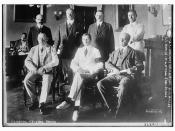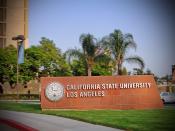Walter E. Williams Born in Philadelphia, Pennsylvania, Walter E. Williams has a B.A. degree in economics from California State University and M.A. and a Ph.D degree in economics from UCLA. He also has a Doctor of Humane Letters from Virginia Union University and Grove City College and a Doctor of Laws degree from Washington and Jefferson College.
Since 1980 Williams has been employed as a professor at George Mason University in Fairfax, Virginia, as John M. Olin Distinguished Professor of Economics and is the Chairman of the Economics Department. He also works as an Adjunct Professor of Economics at Grove City College in Grove City, PA. He has also served on the faculties of Los Angeles City College, California State University Los Angeles, and Temple University in Philadelphia.
Williams is the author of over eighty publications which have appeared in such magazines as Newsweek, and Readers Digest. He has also written six books: America: A Minority Viewpoint, The State Against Blacks, All It Takes Is Guts, South Africa's War Against Capitalism, , Do the Right Thing: The People's Economist Speaks, and More Liberty Means Less Government.
The State Against Blacks was later made in to a documentary. South Africa's War Against Capitalism had to be revised for South African publication.
Mr. Williams has received numerous awards including: Hoover Institution National Fellow, Ford Foundation Fellow, Valley Forge Freedoms Foundation George Washington Medal of Honor, Adam Smith Award, California State University Distinguished Alumnus Award, George Mason University Faculty Member of the Year, and Alpha Kappa Psi Award.
Williams participates in many debates and conferences, is a frequent public speaker and often gives testimony before both houses of Congress.
Williams is often refered to as "The Peoples Economist"ÃÂ, I think this is because sticks up for the people against big corporations and our government on issues such as taxation. I like to refer to him as "The American Economist"ÃÂ.

![[Portrait of Imogene Coca, Mary Lou Williams, and Ann Hathaway, between 1938 and 1948] (LOC)](https://s.writework.com/uploads/9/91750/portrait-imogene-coca-mary-lou-williams-and-ann-hathaway-be-thumb.jpg)
![[New York City Mayor William J.] Gaynor reviewing parade (LOC)](https://s.writework.com/uploads/3/32760/new-york-city-mayor-william-j-gaynor-reviewing-parade-loc-thumb.jpg)
![Williams [and] Young Britt (LOC)](https://s.writework.com/uploads/3/32760/williams-and-young-britt-loc-thumb.jpg)

